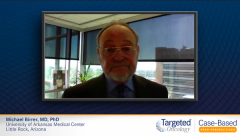
Overview: A 70-Year-Old Woman With Advanced Endometrial Cancer
Expert perspectives on the work-up and management of a 70-year-old woman who is diagnosed with advanced endometrial carcinoma.
Episodes in this series

Case: A 70-Year-Old Woman With Endometrial Cancer
Initial Presentation
- A 70-year-old postmenopausal woman presents after experiencing abnormal uterine bleeding for about 3 months. She has a grown daughter, underwent menopause at 52 years of age, and her father had prostate cancer in his late 60’s.
- PMH: Unremarkable
- PE: Notable for large uterus and tenderness upon palpation
Clinical work-up
- Endometrial biopsy: endometrioid adenocarcinoma, FIGO grade 1
- Surgery: ELAP TAH BSO with bilateral pelvic node dissection
- Pathology: grade 2 endometrioid adenocarcinoma, 15 negative pelvic nodes, invasive 1.9 cm of 2.4 cm myometrium
- Molecular testing shows MSI-high, MMR proficient, and HER2-
Treatment
- Postoperative radiotherapy: vaginal cuff brachytherapy to a dose of 21 Gy in 3 fractions
- 12 months after completing radiotherapy, she presented with new RLE edema and right hydroureter
- She then was treated with carboplatin/paclitaxel chemotherapy which was well tolerated
Treatment
- 15 months later the patient has disease relapse with metastases to the paraaortic lymph nodes
- She is now treated with pembrolizumab
Transcript:
Michael Birrer, MD, PhD: We’re going to discuss an interesting and relevant case of a 70-year-old woman with endometrial cancer. She initially presented postmenopausal after experiencing abnormal uterine bleeding for about 3 months. She has a grown daughter and underwent menopause at 52 years of age. Her father had prostate cancer in his late 60s. Her past medical histories are unremarkable, and her physical exam is notable for a large uterus and a tenderness upon palpation. Clinical work-up went directly to endometrial biopsy, which showed endometrioid adenocarcinoma, FIGO [Federation of Obstetrics and Gynecology] grade 1. Surgery included an exploratory laparotomy, hysterectomy, and bilateral salpingo-oophorectomy with pelvic node dissection. The pathology on the surgery revealed a grade 2 endometrioid adenocarcinoma, with 15 negative pelvic nodes, and the tumor itself was invasive, 1.9 cm of a 2.4-cm myometrium. Molecular testing at that time showed a microsatellite instability [MSI]–high tumor. Interestingly, it was MMR [mismatch repair] proficient and HER2 [human epidermal growth factor receptor 2] negative.
This is a classic presentation for a patient with endometrial cancer who’s postmenopausal, and it usually presents with abnormal vaginal bleeding. The past history is unremarkable; it doesn’t tell us much. Biopsy showed a well-differentiated tumor, but the actual surgical specimen showed an upgrade in the tumor pathology to grade 2. That’s not atypical. We see this all the time in that the sampling for the biopsy can be different from the surgical specimen. At the time, her treatment recommendation was postoperative radiotherapy, vaginal cuff brachytherapy to a dose of 21 Gray in 3 fractions. Twelve months after completing radiotherapy, she presented with new right lower extremity edema and right hydroureter, presumably from a tumor. She was treated with carboplatin paclitaxel chemotherapy, which was well tolerated. Fifteen months later, the patient had disease relapse with metastasis to the para-aortic lymph nodes, and she’s being treated with pembrolizumab.
The molecular analysis, looking at the actual microsatellites, showed that the tumor was unstable and MSI high, but the immunohistochemical staining of the tumor showed it was MMR proficient. We do see these incongruous results because if some of the proteins that contribute to a mismatched repair undergo mutation but still produce a dysfunctional protein, they will immunostain, such as in this patient. In this case, the molecular analyses of microsatellites were very helpful. Postoperative treatment included radiotherapy and vaginal cuff brachytherapy directly to the previous tumor bed. This is a grade 2 tumor, and it extended to the outer 50% of the uterus.
In my practice, I probably would have given this patient some chemotherapy. But I tend to be very aggressive with these tumors. This patient got only radiation therapy. Then the patient recurred with a hydroureter and right lower extremity edema and was treated with chemotherapy. Although we’re not told, those symptoms likely responded and resolved. Fifteen months later, the diseases relapsed with metastasis to the para-aortic nodes again. It’s not terribly surprising knowing the natural history of endometrial cancer. Because of the molecular analysis showing MSI high, the patient is treated with pembrolizumab.
Transcript edited for clarity.









































